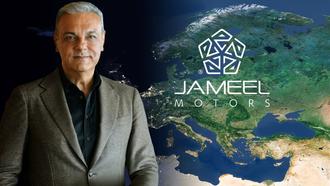Are EVs winning the race in the Middle East?

As the world accelerates its efforts to ‘go green’ and combat the climate crisis of global warming, sales of electric vehicles (EVs) are surging. Globally, battery-powered vehicles accounted for around 20% of new car sales in 2023, a tenfold increase in market share compared to just five years ago.[1] Moreover, the electric takeover is gaining speed. In 2023, EVs enjoyed a 35% year-on-year increase from 2022. More, new EVs were registered each week in 2023, than during an entire year a decade earlier. Wherever one looks, friends and neighbors appear to be purchasing green vehicles at an electrifying pace.
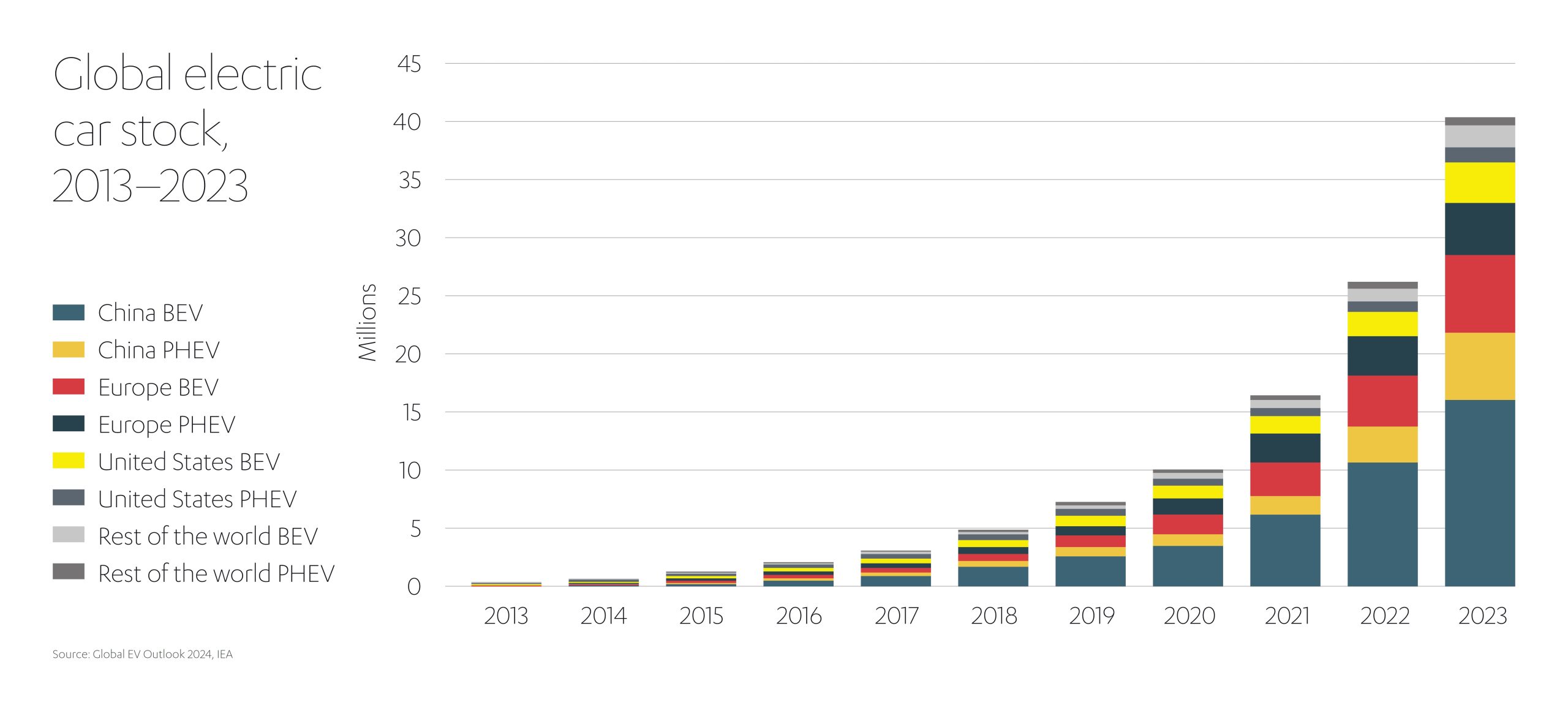
However, there is one caveat: This perception depends overwhelmingly on where one calls home. The 14 million new EVs registered in 2023, may have lifted the global stock to just over 40 million vehicles, but more than 90% of these sales were based in the mature mobility markets of Europe, China and the United States.
In emerging markets around the Middle East, Eurasia and Africa, EV adoption has remained comparatively sluggish. Across the Middle East as a whole, green vehicle registrations comprise less than 1% of total car sales – a statistical outlier given the global swing behind eco-friendly transport.[2]
The standard reason for the Middle East’s slower uptake of EVs tends to focus on the region’s long relationship with oil, the natural resource which has made many countries in the region wealthy on the back of global fossil-fuel dependency. Oil generates more than a trillion dollars of revenue each year in the region and is tipped to continue growing by almost 4% annually between now and the end of the decade.[3]
There are signs that the lack of appetite for EVs in the Middle East is changing, however, spearheaded by the economic success story of the United Arab Emirates. In 2023, the UAE registered around 35,000 new EVs,[4] raising the UAE’s EV sales penetration rate to 3% – still considerably lower than the global average, but significantly higher than fellow Gulf states like Qatar (0.6%) and Saudi Arabia (0.1%).[5]

Encouraged by this, the UAE is hoping half of all vehicles on its roads will be electric by mid-century. That enthusiasm could be contagious. Industry watchers expect this buoyancy to rapidly spill over into other Middle Eastern markets. Global business advisory Deloitte foresees the Middle East EV market undergoing dramatic growth in the coming years, potentially reaching US$ 7.65 billion by 2028, almost three times its US$ 2.7 billion value in 2023.[6]
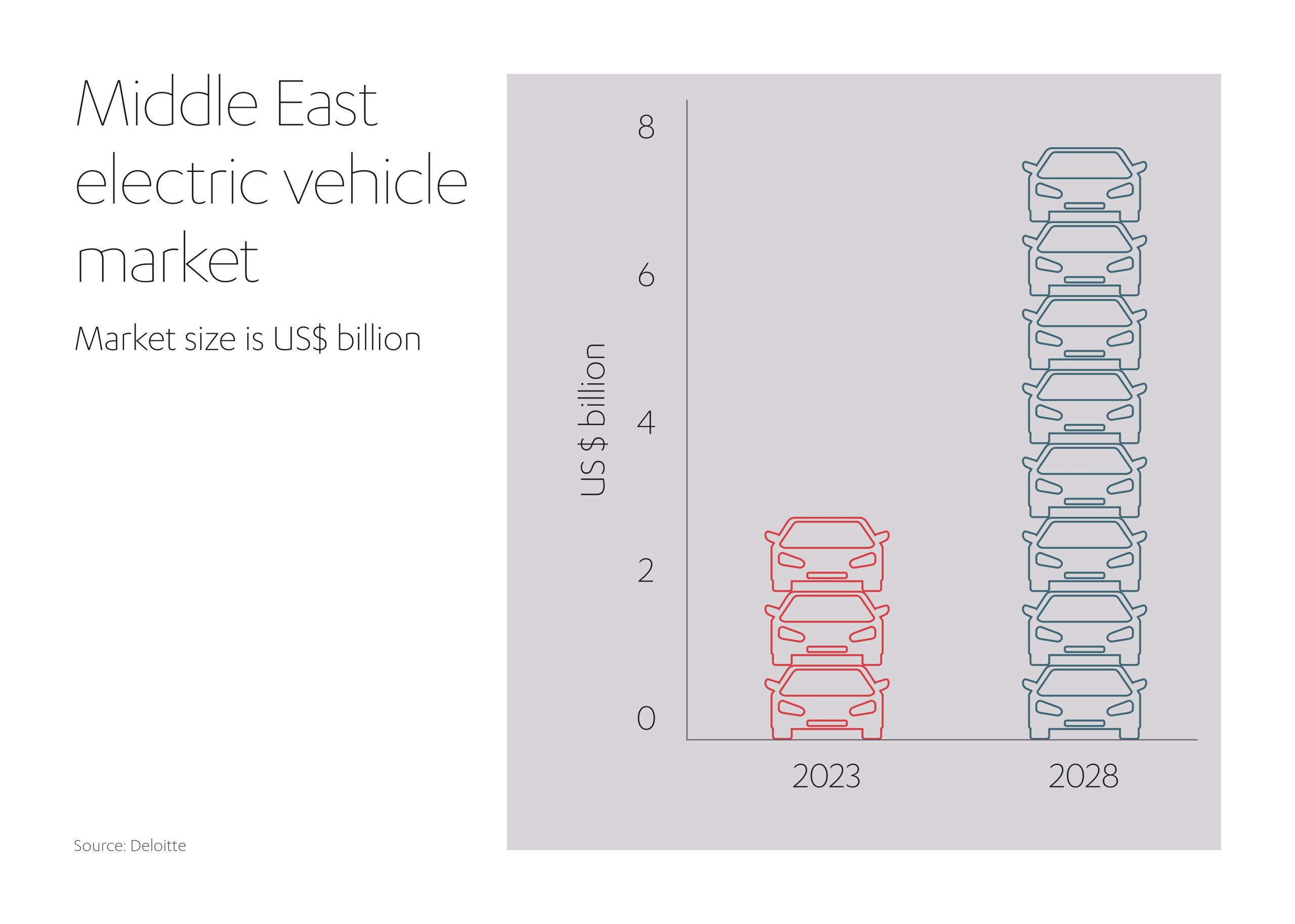
So, what is prompting this belated yet welcome change in fortunes for the EV market in the Middle East, and what roadblocks remain in the way of an expected green transition?
Legislation encourages public-private push for EVs
The anticipated boom in EV sales within Middle Eastern markets can be attributed to several factors: The introduction of pro-EV legislation by governments; competition between high-profile manufacturers seeking a foothold in the region; the signing of joint ventures to share risk and maximize reward; and ambitious investments to bankroll the expansion of battery storage solutions.
Few industries can achieve the lofty trajectories anticipated for EVs without state-level support. Across the Middle East, we are seeing initiatives launched to hasten their journey into the mainstream.
The Saudi Arabian Standards Organization (SASO), for instance, is currently fine-tuning regulations for the use of EVs on public roads, opening the door for wider adoption. Concurrently, the Saudi Public Investment Fund (PIF) is recognizing that the future is electric by backing companies such as Japanese auto giant Hyundai, and US sustainable mobility pioneer Lucid Motors, with billions of dollars to start manufacturing EVs in the coiuntry. Lucid’s first factory opened in Jeddah in September 2023, with a commitment by the Saudi government to purchase up to 100,000 Lucid EVs over the next decade.
Saudi Arabia is further seizing the initiative by funding its own state-sponsored green vehicle. Foxconn’s (Hon Hai Technology Group) Ceer, based in the King Abdullah Economic City (KAEC) on the Red Sea coast, hopes its first fleet of electric sedans and SUVs will roll off production lines by 2025. The project is drawing on the sovereign wealth kitty to co-fund a US$ 9 billion facility manufacturing microchips, EV components and related electronics. Such a bold strategy should pay dividends, with Ceer expected to attract US$ 150 million of foreign investment, create some 30,000 jobs, and contribute around US$ 8 billion to the country’s GDP by 2034.[7]
In the UAE, meanwhile, the Road Transport Authority (RTA) is laying the legislative groundwork for a more comprehensive network of charging stations around the country. New regulations in Abu Dhabi specify for the first time rules regarding the ownership and management of EV supply equipment.
These new laws, together with recent EV-friendly pricing mechanisms for customers, are bringing clarity to the industry and helping make private investment a more attractive proposition.
Dubai has its own 2030 Green Transport Strategy, establishing a target of more than 40,000 EVs on the roads by the end of the decade. Leading by example, the government intends to ensure that 30% of its own vehicle fleet is electric or hybrid by 2030. Part of its strategy involves making EV ownership more convenient and practical, hence its declaration that at least 5% of all parking spaces must from now on be designated exclusively for low-emission vehicles.
The UAE’s active promotion of green transport has been pivotal to creating a fertile environment for EVs, the country ranking seventh in 2023’s Global Electric Mobility Readiness Index.[8]
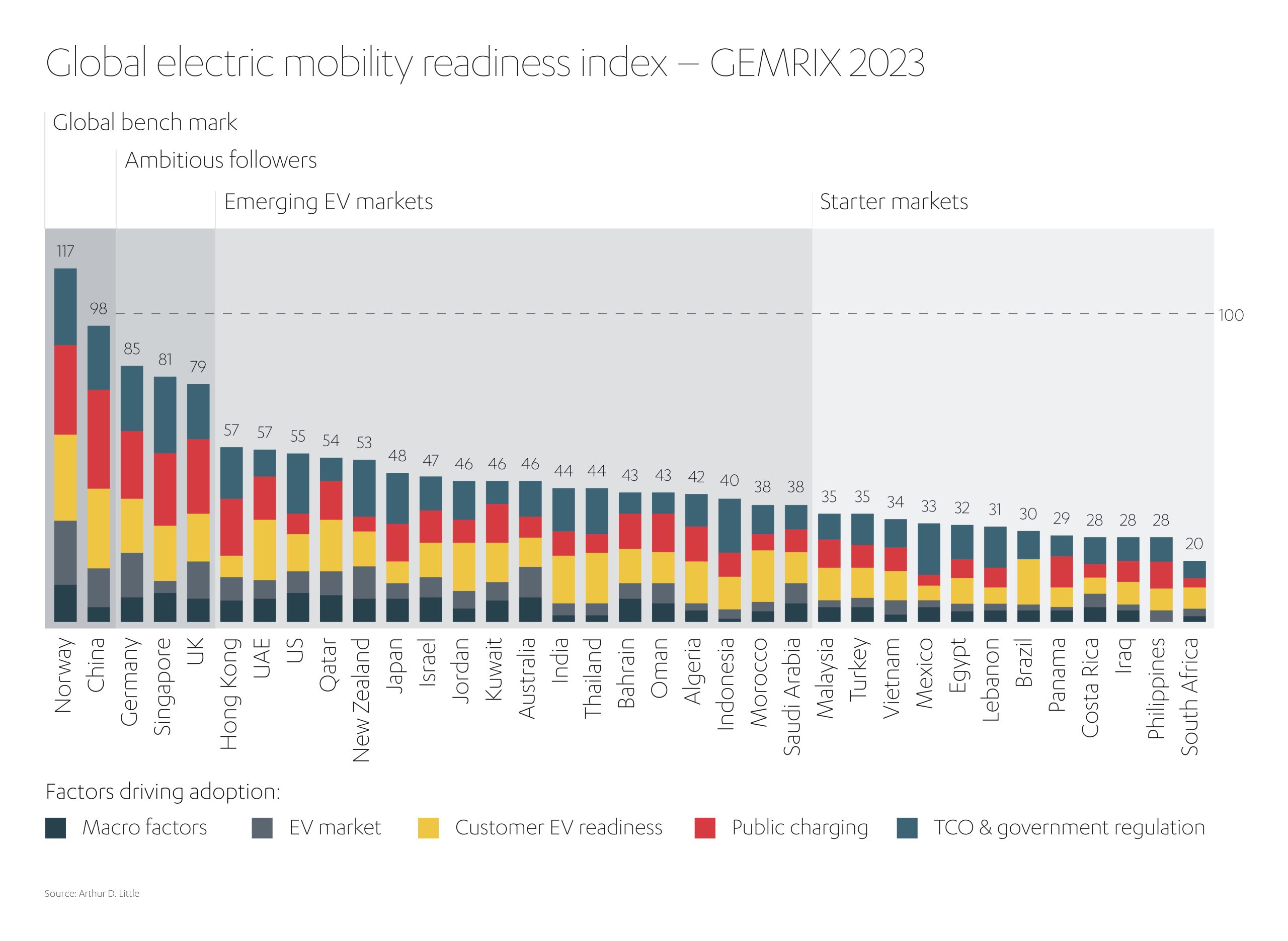
Jordan provides ample evidence of the transformative power of legislation. In 2020, Jordan cut import duties on EVs from 25% to 10%, considerably lower than taxes imposed on hybrid (55%) and petrol (86%) cars. The result? Passenger EV sales grew almost 46% in 2023, reaching 23,400 units.[9] The move will bring ongoing benefits, potentially lifting EV sales to 40,000+ annually by 2032.[10]
Joint investments are likewise proving a smart method of splitting the risk and achieving economies of scale, particularly for market newcomers.
Abu Dhabi investment firm CYVN Holdings, for instance, has invested US$ 1.1 billion in Chinese EV maker NIO to stimulate business growth. Nationally, the UAE Ministry of Energy and Infrastructure has partnered with Swedish electric trucking company Einride to encourage sustainable freight throughout the region, with a deal to supply 2,000 electric trucks and a further 200 autonomous trucks.
Across the border in Saudi Arabia, the Ministry of Investment has signed a US$ 5.6 billion deal with Chinese startup Human Horizons to build and sell electric vehicles in its territory.
In a further example of cross-fertilization of talent and capital, US manufacturer Gauss Auto last year joined with Bahrain’s Marson Group to open Bahrain’s first EV factory. The factory, situated in the Salman Industrial City in the American Trade Zone, will make a range of vehicles including two-wheelers, tricycles and passenger cars.
In such an energized environment it is perhaps little wonder that major international manufacturers of EVs are beginning to explore the Middle East auto market.
China charges ahead in Middle East EV markets
US auto giant Ford is planning to launch its own range of EVs across the Gulf region no later than 2025. In so doing, Ford is following the lead set by fellow American OEM General Motors, which introduced the Cadillac Lyriq, GMC Hummer EV and Chevrolet Bolt EUV to the Middle East in 2023. America is far from alone in seeing the potential for an EV surge in the Middle East. China – the dominant force in EVs globally with 60% of worldwide sales – is, unsurprisingly, leading the Middle Eastern charge.
The UAE has proven particularly receptive to EVs from China, a cooperation doubtless eased by the UAE’s recent admittance into the BRICS political and trading organization, of which China was a founding member. The number of Chinese manufacturers launching EVs in the UAE reached double figures in 2023, with the UAE ranking ninth among China’s top 10 vehicle export markets, shipping some 159,000 units.[11]
Already in 2024 Dongfeng Motors’ subsidiary Venucia has scored a series of strategic pacts with a range of regional partners, while Arcfox and Skyworth Auto have also sealed vehicle import deals worth billions of dollars.
BYD Auto, based in Shenzhen, is another Chinese EV producer growing its Middle Eastern presence. It reports surging interest within Jordan, where rival EVs such as Tesla and Volkswagen’s ID.4 have already established an appetite for green mobility. In Egypt, BYD’s plug-in hybrids and EVs are managing to compete effectively with more established marques, partly by focusing on the taxi market.
With positive momentum behind the transition to EVs in the Middle East, eyes pivot to the future. What hazards remain in the road for manufacturers of green vehicles, and what steps could be taken to consolidate such an encouraging trajectory?
Innovation proves EV hurdles are not insurmountable
Positive publicity and healthy sales are steps in the right direction, but without a robust support infrastructure the EV revolution in the Middle East could fail to fulfil its early promise.
If local manufacturers cannot source batteries to power their cars, or if buyers are confronted by inadequate charging options, they will vote with their wallets and revert to fossil fuel alternatives.
Fortunately, several countries are moving quickly to lay the groundwork for sustainable motoring.
The UAE this year unveiled plans to construct a 40 GWh gigafactory in the Ras Al Khaimah Economic Zone to produce semiconductor battery cells.[12] The plant will be part-funded with US$ 3.2 billion investment from US-based battery maker Statevolt. It comes hot on the heels of plans for the first battery recycling facility in the region. The plant, a partnership between the UAE’s Ministry of Energy & Infrastructure, Lohum and BEEAH Group, will process up to 3,000 tons of li-ion batteries annually, while also reconditioning 15 MWh of batteries suitable for energy storage systems.[13]
Saudi Arabia, in turn, has been funneling billions of dollars from the Ministry of Industry and Mineral Resources into a new EV battery metals plant and steel production facility. The project, part of a broader scheme to attract US$ 32 billion investment into the minerals sector, is seen as integral to Saudi Arabia’s dream of becoming MENA’s mining and logistics hub.[14] Following the investment, the ministry received more than a hundred exploration license applications from foreign companies.
Charging stations are continuing to proliferate, too. Given the comparatively low number of EVs in the region overall, the Middle East already has an impressive vehicle-to-point ratio of 6.5 – well ahead of the global average of 15.9. However, within this figure lies significant disparity between different countries, from a 1.8 ratio in Qatar, to 7.1 in the UAE, to 10.4 in Saudi Arabia – and the expansive landscapes of these areas makes generous charger supply a necessity rather than a luxury.
The push for a comprehensive charging network is ongoing. In the UAE, for instance, the number of charge stations has now expanded to 350, with the Dubai Electricity and Water Authority (DEWA) planning to install more than 1,000 extra plug-in points by the end of 2025. Etihad Water & Electricity is embarking on an EV charger spree, fitting an array of AC and DC chargers across the north of the country. The power of partnerships is proving its potency too, with TAQA and ADNOC Distribution joining forces to build and run its own chain of EV charging stations.
In Saudi Arabia, legislators know that most EVs are charged overnight at home. The Saudi Electric Vehicle Charging Infrastructure Development Initiative is targeting more than 50,000 domestic charging stations by the end of 2025[15]. Simultaneously, the Saudi Electric Company has a deal in place with Nissan Motors, Takaoka Tokyo and the Tokyo Electric Power Company to develop a network of fast-charger EV stations across the country[16] – vital if widespread adoption is to be achieved.
Saudi Arabia is also keen to demonstrate how technology can transform EV charging. Auto service provider Petromin has founded a subsidiary known as Electromin, tasked not only with launching 100 EV charging points across the country, but also an accompanying mobile app to help people plan their charging patterns.
The Jordanian government, eager to demonstrate the efficiency and legitimacy of EVs, has invested in more than 10,000 public charge points, as well as purchasing hundreds of Teslas as government vehicles.
Climate concerns
Despite these advances, more work lies ahead in allaying general misgivings about the suitability of EVs for the unique Middle East environment.
Electric vehicles have generally been developed in cooler, damper climates than those offered by the Middle East, where hot, dry days are the norm. Such conditions have been shown to impact battery performance, with one study suggesting temperatures above 35ºC can reduce potential driving distances by up to 17%.[17]
Manufacturers are aware of the issue, however, and are working hard to tailor solutions. Specialized EV components are being designed to withstand extreme temperatures, and cooling systems are being hurriedly enhanced to preserve battery lifespan and harmonize performance levels.
Doubts also remain over so-called ‘range anxiety’ – the concern that EVs can only travel a limited distance on a single charge. This perception is particularly harmful in the Middle East, given the region’s vast and unforgiving desertscapes. However, the latest generation of EVs are starting to change the conversation. In tests, a number of EVs now boast driving ranges exceeding 500 or even 600 miles per charge, including models from Tesla, NIO and Lucid, all of whom have a presence in the Middle East.[18] Several dozen other EVs have crossed the 400 mile threshold, showing that such impressive milestones are becoming the rule rather than the exception.
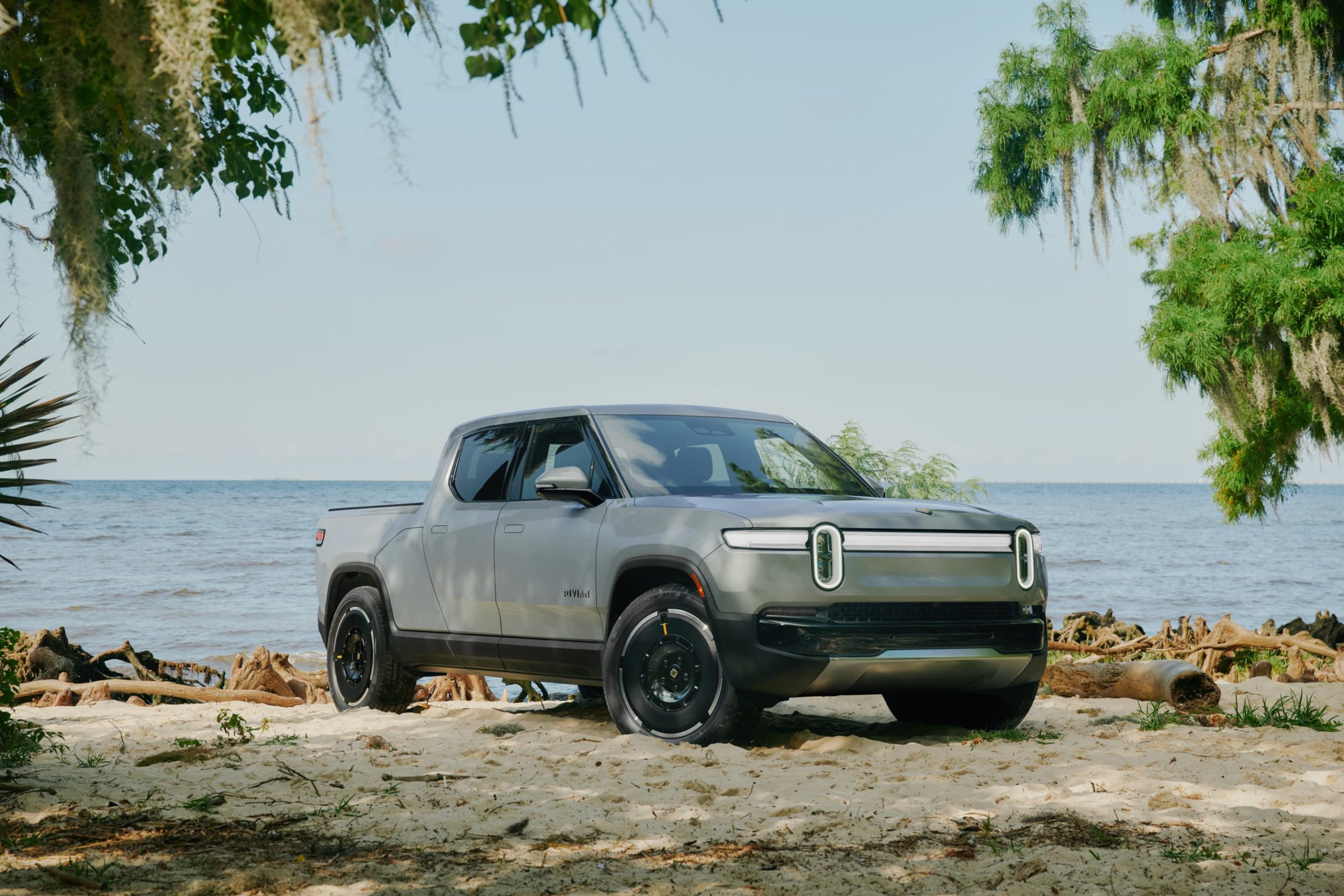
One of these is the R1T, manufactured by California-based Rivian, a tech startup in which Abdul Latif Jameel was an early investor. The Jameel family’s ambitious support for Rivian is just one of the ways in which Abdul Latif Jameel is contributing to the move towards more sustainable mobility solutions in markets across the globe.
Steering the Middle East towards an EV future
People deserve a future mobility scenario that is cleaner, faster and smarter – a future in which sustainability becomes a genuine option for everyone.
In early 2023, Jameel Motors accelerated its quest to electrify the mobility sector by becoming the official national distributor for MG Motor in Morocco , GAC Motor in Egypt, and BYD in Türkiye.
Most recently, Jameel Motors (international) announced a landmark collaboration with Chinese giant Zhejiang Geely Holding Group to distribute the Farizon Auto New Energy Commercial Vehicles globally in 11 countries, with a combined population of over 450 million, including many new market entries for the Farizon new energy CV brand.
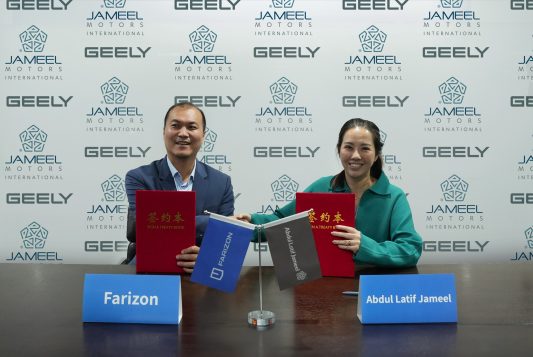
These alliances build on Jameel Motors’ tradition of supplying hybrid and electric vehicles across much of the Middle East, China and North Africa – and in particular its longstanding partnership with Toyota, itself an original pacesetter in the new energy vehicle sector.
Other notable partnerships include the long-standing distribution relationship for hybrid Lexus cars across Saudi Arabia, Morocco, Turkey and China. Hybrids are widely regarded as a necessary steppingstone between fossil fuel cars and those run entirely by batteries.
Abdul Latif Jameel has also invested in Greaves Electric Mobility in India, helping sales of electric two and three-wheelers outpace combustion equivalents for the first time. This exciting collaboration will help cut urban pollution and bring e-mobility within financial reach of more families.
Affordability issues are also the focus of Jameel Finance, which in June this year launched a new financing program designed to promote the uptake of EVs in Egypt. The scheme helps potential buyers own an electric vehicle up to the value of EGP 3 million (around US$ 63,000) via a range of financing options, including flexible repayment schemes of up to five years – with similar deals in place for insurance and maintenance.
Radical funding initiatives are welcome, given the Middle East’s generally inconsistent financing regimes and, in some societies, lack of access to easy credit.
The Middle East is very ready, psychologically at least, to embrace the benefits of electric vehicles. the UAE and Oman have established net-zero deadlines of 2050, while their neighbors in Saudi Arabia aim for 2060. Qatar and Egypt are significantly planning to reduce greenhouse gas emissions in heavy polluting sectors, including mobility, by 2030. Billions have been ploughed into EV infrastructure and promotion across the region – investments which are beginning to pay dividends with the Middle East’s gradual uptake of green vehicles. In a culture long wedded to oil and gas, however, it would be remiss not to acknowledge that sales have so far lagged- behind those achieved in more mature markets. In the quest to turn the tide on global heating the public and private sectors must find common cause, deploying their complementary assets to encourage the swifter rollout of eco-vehicles across the Middle East.
Research shows car buyers in the Middle East are famously forward-looking, favoring models which are “futuristic looking, mechanically advanced and filled to the brim with digital innovations”, according to Deloitte.[19] If the regional EV market is to fulfil its potential of tripling in value over the next five years, it will be because legislators, manufacturers and financiers are guided and inspired by the aspirations of an enlightened buying public.
[1] https://www.iea.org/reports/global-ev-outlook-2024/trends-in-electric-cars
[2] https://www.iea.org/reports/global-ev-outlook-2024/trends-in-electric-cars
[3] https://www.globenewswire.com/news-release/2023/10/04/2754445/0/en/Middle-East-Oil-Gas-Market-Report-Market-Size-Share-Consumption-Production-Historical-and-Forecast-Data-2019-2030.html
[4] https://rhomotion.com/news/the-middle-east-ev-market-trends-investment-and-opportunities/
[5] https://www.rolandberger.com/en/Insights/Publications/EV-Charging-Index-Expert-insight-from-the-Middle-East.html
[6] https://www.deloitte.com/middle-east/en/our-thinking/mepov-magazine/securing-the-future/the-middle-east-goes-electric.html
[7] https://www.reuters.com/business/autos-transportation/saudi-crown-prince-launches-ceer-first-saudi-electric-vehicle-brand-2022-11-03/
[8] https://www.adlittle.com/en/insights/report/global-electric-mobility-readiness-index-gemrix-2023
[9] https://www.iea.org/reports/global-ev-outlook-2024/trends-in-electric-cars
[10] https://jordantimes.com/news/local/jordans-ev-sales-expected-spike-459-2023-report-finds
[11] https://news.cgtn.com/news/2024-03-13/Middle-East-insights-Why-is-UAE-a-target-market-for-Chinese-EVs–1rWBEXns6pG/p.html
[12] https://www.investmentmonitor.ai/news/statevolt-to-build-new-battery-cell-gigafactory-in-uae/
[13] https://rhomotion.com/news/uae-announces-first-battery-recycling-plant/
[14] https://www.spglobal.com/commodityinsights/en/market-insights/latest-news/metals/050822-saudi-arabia-to-develop-ev-metals-steel-projects-as-part-of-32-bil-investments
[15] https://www.evcandi.com/news/saudi-arabia-launches-company-roll-out-ev-infrastructure
[16] https://www.reuters.com/article/business/saudi-electricity-signs-deal-with-japanese-firms-for-first-ev-pilot-idUSKBN1F30U1/
[17] https://info.oregon.aaa.com/aaa-study-whats-the-real-range-of-electric-vehicles
[18] https://www.evspecs.org/electric-cars-with-the-longest-range
[19] https://www.deloitte.com/middle-east/en/our-thinking/mepov-magazine/securing-the-future/the-middle-east-goes-electric.html





